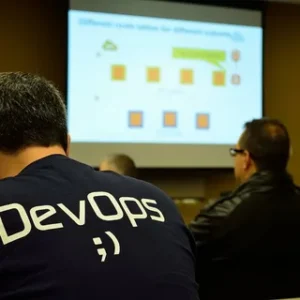Introduction
In the era of cloud-native applications and real-time user expectations, businesses must continuously innovate without compromising system stability or security. The traditional separation between development and operations creates silos that slow delivery, introduce risk, and fail to meet the velocity required in modern markets.
DevOps services unify software development, IT operations, and quality assurance through automated pipelines, standardized workflows, and security integrations. This transformation enables faster product releases, reduced downtime, and greater organizational agility.
By adopting a comprehensive DevOps strategy including CI/CD, Infrastructure as Code (IaC), configuration management, observability, and DevSecOps enterprises build resilient, scalable systems that support digital transformation goals and drive competitive advantage.

What Makes DevOps Services Enterprise Grade
Enterprise-grade DevOps is defined by its focus on scale, repeatability, and compliance. Unlike ad hoc automation, these services adhere to standardized, audit-ready practices that ensure operational excellence across complex environments.

Key Features
- Immutable Infrastructure: Systems are provisioned and maintained as code, minimizing human intervention and ensuring environment consistency.
- Zero-Downtime Deployments: Techniques such as blue-green and canary releases support continuous delivery without service interruption.
- Policy-as-Code & Compliance Automation: Security and regulatory standards are embedded into the development lifecycle, enabling audit readiness for industries such as healthcare, finance, and e-commerce.
- Enterprise Resilience: DevOps frameworks foster incident response, high availability, and operational recovery planning.
Enterprises gain the ability to deploy securely at scale, accelerate time-to-market, and maintain governance in complex environments.
Continuous Integration & Continuous Delivery (CI/CD)
CI/CD pipelines are foundational to DevOps, enabling organizations to ship high-quality code faster and more reliably.
CI/CD Core Functions:
- Automated Builds and Tests: Code changes trigger build pipelines that run unit, integration, and performance tests automatically.
- Environment Promotions: Code moves seamlessly across staging and production, with rollback mechanisms in case of failure.
- Release Governance: Quality gates and policy enforcement tools ensure that only compliant, secure releases reach production.
Business Outcomes
- Increased release frequency
- Reduced human error
- Accelerated innovation cycles
- Improved product quality and customer experience
Infrastructure as Code (IaC)
IaC allows infrastructure provisioning to be codified, version-controlled, and reproducible—removing the need for manual setup and reducing configuration drift.
Key Benefits:
- Speed and Consistency: Infrastructure components (networks, VMs, containers) are deployed identically across environments.
- Traceability: All infrastructure changes are logged and versioned, supporting transparency and auditing.
- Scalability: IaC facilitates dynamic scaling and rapid recovery, aligning with modern microservices and container strategies.
Technologies such as Terraform, AWS CloudFormation, and Pulumi support enterprise IaC implementations.
Configuration Management
Configuration management systems standardize environments across development, QA, and production, reducing inconsistencies and enabling reliable deployments.
Capabilities
- Centralized configuration enforcement
- Automated OS patching and software provisioning
- Seamless scaling of standardized environments
Tools like Ansible, Chef, and Puppet automate updates and configuration, reducing deployment time and increasing reliability across hybrid and multi-cloud architectures.
Monitoring & Observability
Observability goes beyond traditional monitoring to deliver real-time insights into application performance, infrastructure health, and user behavior.
Observability Stack Includes
- Metrics: CPU, memory, latency, and throughput tracking
- Logs: Centralized logging for forensic analysis
- Traces: Distributed tracing to visualize microservice communication
- Dashboards: Actionable views for operations and product teams
Solutions such as Prometheus, Grafana, and Datadog provide proactive alerting and help identify issues before they affect users.
Security & Compliance in DevOps (DevSecOps)
DevSecOps integrates security controls and governance into every stage of the DevOps lifecycle.
Security Best Practices
- Static & Dynamic Code Analysis: Early detection of vulnerabilities during development
- Secrets Management: Secure handling of API keys, credentials, and certificates
- Role-Based Access Control (RBAC): Granular access policies across tools and systems
- Encryption Standards: TLS and at-rest encryption for all sensitive data
- Compliance as Code: Automates regulatory checks and produces audit artifacts
By embedding security into workflows, enterprises reduce risk exposure while accelerating delivery.
Incident Response & Operational Resilience
Modern DevOps includes structured approaches to uptime, reliability, and post-incident recovery.
Key Components:
- Automated Alerting and Escalation: Real-time notifications based on system thresholds
- Runbooks & Playbooks: Codified responses to known failure scenarios
- Post-Incident Reviews: Root cause analysis and continuous improvement culture
- SLA Monitoring: Real-time tracking of service-level objectives (SLOs)
These practices reduce downtime, maintain customer confidence, and improve overall service delivery.
Tangible Business Impacts of DevOps Services
Organizations implementing DevOps at scale realize transformational business outcomes:
- Up to 50% faster release cycles
- Over 70% reduction in deployment failures
- 30–40% cost savings on infrastructure and operations
- Improved cross-functional collaboration
- Stronger brand loyalty and customer satisfaction
By embedding operational efficiency into every phase of the software lifecycle, DevOps empowers continuous delivery of value.
Call to Action
Enterprises operating in digital-first sectors cannot afford inefficiencies in software delivery or operational risk. DevOps services present a scalable, secure, and future-proof path toward IT transformation.
Whether you’re optimizing for release velocity, compliance, or system reliability, DevOps equips your business with the foundation for continuous innovation.
Unlock DevOps driven growth today
Conclusion
DevOps services are a critical enabler of digital transformation. They offer a systemic, automated, and secure framework that aligns development and operations to deliver at scale. Through CI/CD, IaC, integrated security, and observability, organizations gain a significant competitive edge.



